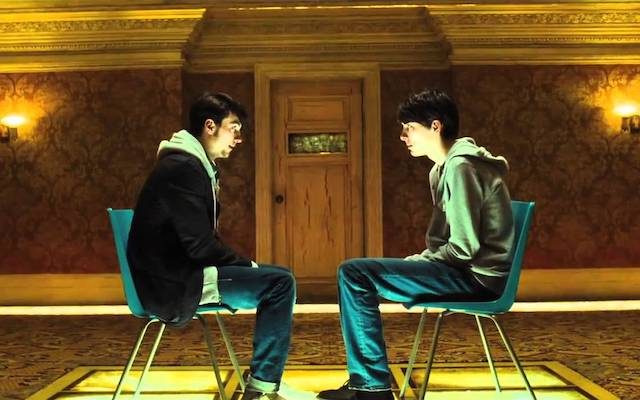
Hey, teens of today! You know what’s super cool and dope? The Internet! But you know what’s totally whack? Suicide. That’s the rad message of the wicked awesome “Chatroom,” a thriller aimed at you, the teens of today! It speaks your language (English) and deals with issues you can relate to, like cyber-bullying and Imogen Poots.
The film features Aaron Taylor-Johnson, star of “Kick-Ass” and “Godzilla” and noted survivor of a cougar attack, as William, a troubled London teen who uses the Internet for its intended purpose of ruining lives. He starts a chatroom called “Chelsea Teens!” (enthusiasm his), which is immediately joined by several local kids his age. You know how excited teenagers get when there’s a new chatroom!
Now, since so much of the film consists of Internet conversations, and since it is boring to watch people type at computers, the movie uses a gimmick to stimulate our feeble brains. The Internet is portrayed as a vast, garishly lit hotel, each room a different chatroom (in this movie, the Internet consists only of chatrooms) in which the participants sit around and talk. It’s basically a chat transcript being read aloud, except that everyone speaks in coherent sentences, nobody says “LOL” or “WTF,” and Scarlett Johansson’s breasts are not mentioned.
The other Chelsea teens who join the chatroom are similar to William in that they all have melodramatic problems ripe for exploiting, dissimilar to him in that they are not sociopaths or played by actors who married women twice their age. Eva (Imogen Poots) is a pretty girl and a model, but her real-life friends are shallow and vain because they are also models. Smart, timid Emily (Hannah Murray) feels like she’s never good enough for her social-climbing parents. Mo (Daniel Kaluuya) is ashamed of himself for having a crush on his best friend’s 11-year-old sister. Jim (Matthew Beard) is a mopey Eeyore with an overwrought story of being abandoned by his father at the zoo when he was 9 years old, a story that would be sad in a real movie but just makes us roll our eyes here.
And William himself? His mother is a famous novelist who based her dashing hero on William’s older brother, so William is jealous and snotty about that. He also has scars on his wrists — movie shorthand for “this person attempted suicide but didn’t do it right.” They don’t write novels about quitters, do they, William?
We gradually come to realize that despite his friendly, earnest demeanor online, like an Internet Boy Scout, what William really wants is to wreak havoc and cause suffering, like an Internet commenter. He tells Emily to commit anonymous acts of vandalism to get her parents’ attention. For Eva, he sabotages a rival model’s career. He tells Jim to quit taking his antidepressants. He advises Mo to tell his friend about his inappropriate feelings for his sister, assuring him the friend will understand. (The friend does not.)
What’s with all the bad advice? Is William the devil? Is he Dr. Drew? No, he’s just a miserable bastard who wants everyone else to also be miserable bastards. The question is why the other kids take his advice even though they are pretty smart and the advice is obviously terrible. It’s not like William is persuasive or charismatic, not in person, and certainly not when it’s just his words appearing in a chatroom window. But it shouldn’t surprise us that a movie about teenagers and the Internet that doesn’t understand how the Internet works would also not understand how teenagers work. It is in keeping with the general theme.
In the film’s climax, William has persuaded the now unmedicated Jim to kill himself, and has even procured a gun for him. (Remember, this is England, where getting a gun would actually be difficult for a teenager to do.) The other Chelsea Teens rush all over the Internet and actual London looking for Jim, hoping to stop him before it’s too late. The idea of intentionally manipulating a depressed teenager into dumping his medication and committing suicide is horrifying in a real-world context, but don’t worry: the movie is too obvious and stupid to be taken seriously. Instead, it’s just distasteful and exploitative, a dopey melodrama aimed at undiscerning young audiences despite having no idea how to talk to them. How it failed to make $100 million, I’ll never know.
— GeekNation





